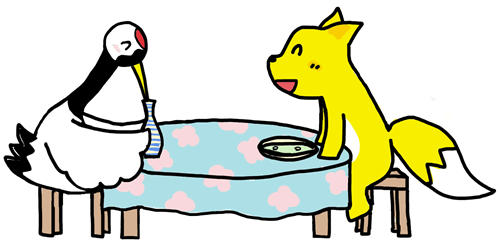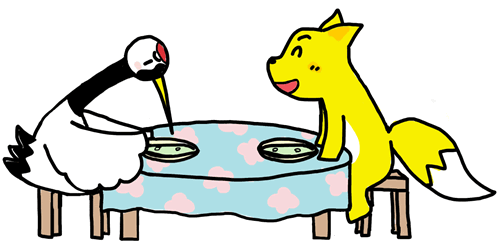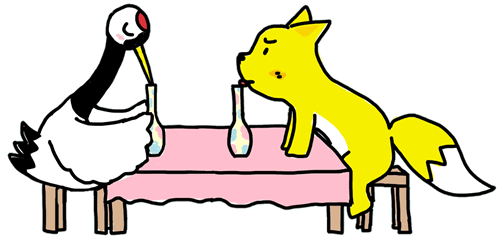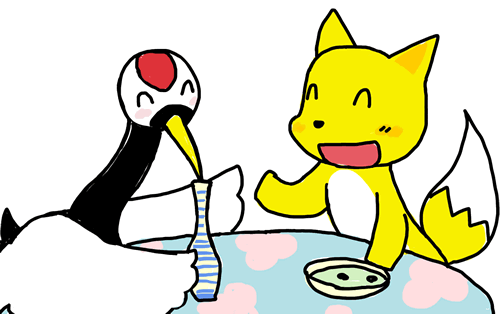ふくむすめどうわしゅう(Hukumusume fairy tale collection) > がいこくご(Foreign language)
>イソップどうわ(Aesop’s Fables)

イラスト myi
キツネとツル
A fox and Crane
(イソップどうわ)
(Aesop’s Fables)
ほんやく(Translation) ちいさな翻訳屋さん
Japanese(にほんご) ・ English(えいご) ・ Korean(かんこくご) ・ French(ふらんすご)
Japanese & English ・ Japanese & Korean ・ Japanese & French
アニメサイズ
Max 3840×2160 字幕「日本語」「英語」「中国語」「フランス語」「韓国語」
キツネ が ひらたい おさら に マメ の スープ を いれて、ツル に すすめ ました。
A fox offered bean soup in a flat plate to a crane.
「・・・・・・」
“……….”

ツル が こまって いる のを みて、キツネ は わらい ました。
The fox laughed at the crane which looked annoyed.
スープ が みずっぽく て、ツル の ほそい くち には はいらない からです。
The soup was so watery that there’s no way for the crane to sip with the long and thin mouth.
ところ が こんど は ツル が キツネ を しょくじ に よんで、ほそながい くび の びん に ごちそう を いれて だしました。
One day, the crane invited the fox to dinner and served food in a bottle with the long and thin neck.

ツル は らく に くち を つっこんで たべました が、
Though the crane ate it putting his mouth into the bottle easily,
キツネ の くち は ほそながい くび の びん には はいらない ため、どうしても たべる こと が できません。
the fox couldn't eat it because he couldn't put his mouth into the bottle with the long thin neck.
キツネ に しかえし を した ツル は、こまって いる キツネ を みて わらい ました。
The crane, who succeeded getting back at the fox, laughed at the fox in trouble.
こんな ふう に、がくしゃたち が しょくじ の とき に むずかしい りくつ の もんだい を もちだす と、
Thus, if scholars bring up difficult subjects to talk about at meal times,
それ が わからない ふつう の ひとびと は たいくつ しますし、
ordinary people would be bored not knowing what to say to respond.
はんたい に ふつう の ひとびと が バカげた はなし を もちだす と、がくしゃたち は いや な かお を します。
Oppositely, if ordinary people raise a foolish topic to talk about, scohlars would be unpleasant.
たちば の ちがう ひとたち が しょくじ を すると、こういう こと に なること を、この おはなし は おしえて います。
This story tells us that if people in different positions from each other have meals together, they wouldn't enjoy.

しょくじ は き の あった なかま と、たのしく たべたい ですね。
It’s always better to have meals with your good friends.

おしまい
The end
| 福娘のサイト |
| 366日への旅 毎日の記念日・誕生花 ・有名人の誕生日と性格判断 |
| 福娘童話集 世界と日本の童話と昔話 |
| 子どもの病気相談所 病気検索と対応方法、症状から検索するWEB問診 |
| 世界60秒巡り 国旗国歌や世界遺産など、世界の国々の豆知識 |



